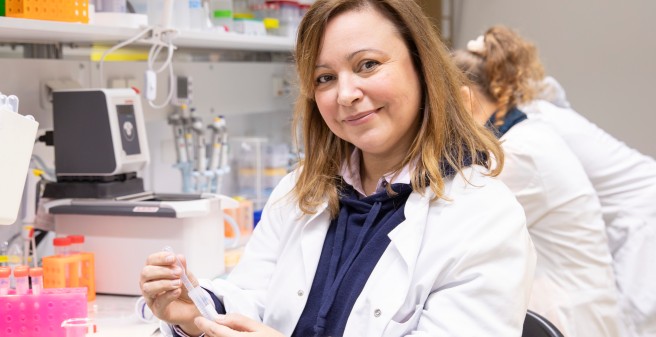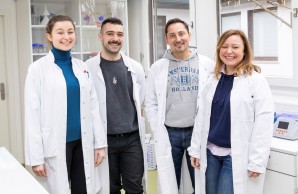Beats from Barcelona
When a stroll along the Alster evokes memories of the Barcelona lifestyle, you must have really grown fond of Hamburg. Six years ago, Prof. Dr. Cristina Molina came to the UKE from the Catalan metropolis via Paris, Essen and Göttingen. Here, the Spanish scientist has been researching chronic atrial fibrillation on an electrophysiological level at the Institute of Experimental Cardiovascular Research – since January 1, 2024 with a Heisenberg Professorship. With her team she recently discovered a highly promising new targeted drug therapy approach.
What Prof. Cristina Molina particularly likes about Hamburg is its vibrant music scene. "Whether it's hip-hop on the Reeperbahn, live jazz in Eimsbüttel or opera in the Elbphilharmonie, you can find new sounds on every corner in this city. I love that”, she replies with a smile in her face. A concert by the Latino rap duo Beatnuts is just as much a pleasure for the heart researcher as the opera "Carmen" by Georges Bizet. Even some German sounds have already made it onto her playlist. Her undisputed favorite band so far – Hamburg rappers Fettes Brot. "But my favorite thing to dance to is Latin American salsa rhythms," she admits with a laugh.
The scientist also deals with the topic of rhythm professionally – more precisely when the heart gets out of sync. In her doctoral thesis, which she completed between 2006 and 2009 in Barcelona and Paris, she analyzed the electrical signaling pathways of human heart muscle cells in the atrium. "It was a childhood dream come true for me," she says. Even at school, she pestered her biology teacher with questions about electrophysiological cell communication. "Until he admitted that science didn't yet have the answers to everything," she smiles. Prof. Molina is now getting to the bottom of some of these questions herself as part of a German Research Foundation (DFG) project. Her current projects are also funded by the Heinz and Gertraud and Heinz Rose Foundation, which provides long-term support to her. "I am happy to have such strong partners, and even more so that I can personally discuss my findings with them and demonstrate the progress of my research every year." From time to time she even visits her biology teacher and enjoy chatting with him.
The two should have no shortage of matters to talk about, as the scientist has made more than one discovery in her 20-year career. While still working on her doctorate, she succeeded in developing a completely new method for preserving human heart muscle cells, thereby extending the survival time from a few hours to several days. Enough time to analyze the cells extensively and test new techniques – which is also a central basis for her own research on chronic atrial fibrillation. "It has long been known that, among other things, changes in the calcium levels within cardiac cells promote arrhythmia. Calcium controls the heartbeat and contraction. In chronic atrial fibrillation, the influx of calcium into the cells is reduced. But the exact reason of this remained unclear for a long time," explains Prof. Molina. In the context of her scientific work, she came across the enzyme phosphodiesterase 8B (PDE8B). She discovered that in case of atrial fibrillation there was too much of PDE8B in the cells, more than in the heart cells of a healthy heart which led to the reduction of the influx of calcium ions regulating the heartbeat and contraction. "The remarkable thing is that PDE8B really only occurs in the cells of the atria”, adds the scientist enthusiastically. “This enables us to treat explicitly diseased cells and not the entire heart.”
Why has Molina specialized in atrial fibrillation? "I think it's important to use research for prevention and improving quality of life of the patients," she explains. Chronic atrial fibrillation remains undetected for a long time, but it’s responsible for various serious secondary diseases. For example, around 30 percent of all strokes are caused by chronic atrial fibrillation. For health issues such as palpitations or arrhythmia there currently only exist symptomatic therapies. Fortunately, that could change soon. There already exists an active substance that inhibits the PDE8B protein and is currently being tested in a clinical trial on dementia. "In initial laboratory tests on human heart muscle cells from patients, we were able to observe a normalization of the calcium currents thanks to the inhibitor." In two to three years, this mode of action will be tested in a clinical trial.
Until then, Prof. Molina has lots of plans. Among other things, she wants to further expand existing collaborations at the UKE, such as with the University Heart and Vascular Centre, and strengthen her own team step by step. She views her Heisenberg professorship as a significant opportunity. "The newfound planning security enables me to initiate and implement long-term projects both within the UKE and at an international level." In her personal life, she looks forward to enjoying Hamburg's summer once again. Whether it’s salsa rhythms or rap beats is not that important to her – it’s all about the right rhythm.
Text: Nicole Sénégas-Wulf, Photos: Eva Hecht

